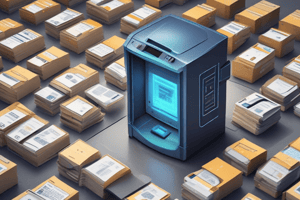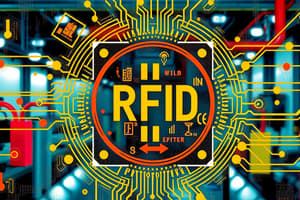Podcast
Questions and Answers
How do RFID tags enhance inventory accuracy in retail?
How do RFID tags enhance inventory accuracy in retail?
- By increasing manual checks on inventory levels.
- By enabling real-time tracking of inventory movement. (correct)
- By reducing the need for physical inventory counts. (correct)
- By eliminating the need for barcodes on products.
What is a primary benefit of blockchain technology concerning data integrity?
What is a primary benefit of blockchain technology concerning data integrity?
- It allows for complete data transparency. (correct)
- It creates a single point of failure.
- It prevents unauthorized access to data. (correct)
- It automates data entry processes.
What role does the IoT play in modern industry?
What role does the IoT play in modern industry?
- It reduces the need for internet connectivity.
- It primarily focuses on improving retail sales.
- It enhances communication between devices for better data collection. (correct)
- It increases the cost of operational efficiency.
What potential risk is associated with autonomous vehicles?
What potential risk is associated with autonomous vehicles?
How do smart traffic management systems enhance urban mobility?
How do smart traffic management systems enhance urban mobility?
What is one major benefit of incorporating automation and robotics into the manufacturing process?
What is one major benefit of incorporating automation and robotics into the manufacturing process?
Which of the following challenges is primarily associated with the use of GMOs in food production?
Which of the following challenges is primarily associated with the use of GMOs in food production?
What significant impact has 5G technology had on global communication?
What significant impact has 5G technology had on global communication?
How does vertical farming contribute positively to environmental sustainability?
How does vertical farming contribute positively to environmental sustainability?
What influence do social media platforms have on business strategies?
What influence do social media platforms have on business strategies?
Flashcards are hidden until you start studying
Study Notes
RFID Tags and Inventory Management
- RFID tags enable real-time tracking of inventory, reducing stock discrepancies.
- Streamlined restocking processes due to enhanced data accuracy on product availability.
- Improved customer satisfaction through increased stock visibility and reduced out-of-stock situations.
Blockchain Technology and Data Integrity
- Blockchain ensures data immutability, making unauthorized changes detectable.
- Enhances transparency in transactions, fostering trust among stakeholders.
- Decentralized nature decreases reliance on single entities, mitigating fraud risks.
IoT in Modern Industry
- IoT facilitates machine-to-machine communication, enhancing operational efficiency.
- Offers predictive maintenance by collecting and analyzing equipment data to anticipate failures.
- Supports data-driven decision-making through real-time insights into processes and supply chains.
Social Media's Influence on Global Communication
- Social media enhances cross-cultural interactions, breaking geographical barriers.
- Brands leverage platforms for targeted advertising and customer engagement, shaping business strategies.
- User-generated content influences public perception and brand loyalty.
Risks of Autonomous Vehicles
- Potential cybersecurity threats due to reliance on software and connectivity.
- Ethical dilemmas in decision-making processes during unavoidable accidents.
- Liability issues arise in incidents involving self-driving vehicles, complicating insurance frameworks.
Impact of 5G Technology
- 5G networks significantly improve data transfer speeds and reduce latency.
- Supports the growth of IoT by enabling more devices to connect simultaneously.
- Enhances remote communication capabilities, fostering innovation in telehealth and remote work.
Automation and Robotics in Manufacturing
- Increases production efficiency and accuracy, reducing human error.
- Robotics take over dangerous tasks, improving workplace safety.
- Can lead to workforce displacement, requiring reskilling and adaptation strategies.
Challenges with GMOs in Food Production
- Public skepticism and controversy surrounding health and environmental impacts of GMOs.
- Regulatory hurdles limit GMO research and deployment in various countries.
- Potential for reduced biodiversity if GMO crops dominate agricultural practices.
Smart Traffic Management and Urban Mobility
- Uses data analytics to optimize traffic flow, reducing congestion and travel times.
- Integrates with public transport systems to enhance accessibility and convenience.
- Monitors real-time traffic conditions, facilitating quicker response to incidents.
Environmental Benefits of Vertical Farming and Hydroponics
- Requires less land and water compared to traditional farming methods.
- Minimizes pesticide use, promoting healthier food production.
- Reduces transportation emissions by enabling localized food production in urban areas.
RFID Tags and Inventory Management
- RFID tags enable real-time tracking of inventory, reducing stock discrepancies.
- Streamlined restocking processes due to enhanced data accuracy on product availability.
- Improved customer satisfaction through increased stock visibility and reduced out-of-stock situations.
Blockchain Technology and Data Integrity
- Blockchain ensures data immutability, making unauthorized changes detectable.
- Enhances transparency in transactions, fostering trust among stakeholders.
- Decentralized nature decreases reliance on single entities, mitigating fraud risks.
IoT in Modern Industry
- IoT facilitates machine-to-machine communication, enhancing operational efficiency.
- Offers predictive maintenance by collecting and analyzing equipment data to anticipate failures.
- Supports data-driven decision-making through real-time insights into processes and supply chains.
Social Media's Influence on Global Communication
- Social media enhances cross-cultural interactions, breaking geographical barriers.
- Brands leverage platforms for targeted advertising and customer engagement, shaping business strategies.
- User-generated content influences public perception and brand loyalty.
Risks of Autonomous Vehicles
- Potential cybersecurity threats due to reliance on software and connectivity.
- Ethical dilemmas in decision-making processes during unavoidable accidents.
- Liability issues arise in incidents involving self-driving vehicles, complicating insurance frameworks.
Impact of 5G Technology
- 5G networks significantly improve data transfer speeds and reduce latency.
- Supports the growth of IoT by enabling more devices to connect simultaneously.
- Enhances remote communication capabilities, fostering innovation in telehealth and remote work.
Automation and Robotics in Manufacturing
- Increases production efficiency and accuracy, reducing human error.
- Robotics take over dangerous tasks, improving workplace safety.
- Can lead to workforce displacement, requiring reskilling and adaptation strategies.
Challenges with GMOs in Food Production
- Public skepticism and controversy surrounding health and environmental impacts of GMOs.
- Regulatory hurdles limit GMO research and deployment in various countries.
- Potential for reduced biodiversity if GMO crops dominate agricultural practices.
Smart Traffic Management and Urban Mobility
- Uses data analytics to optimize traffic flow, reducing congestion and travel times.
- Integrates with public transport systems to enhance accessibility and convenience.
- Monitors real-time traffic conditions, facilitating quicker response to incidents.
Environmental Benefits of Vertical Farming and Hydroponics
- Requires less land and water compared to traditional farming methods.
- Minimizes pesticide use, promoting healthier food production.
- Reduces transportation emissions by enabling localized food production in urban areas.
Studying That Suits You
Use AI to generate personalized quizzes and flashcards to suit your learning preferences.




